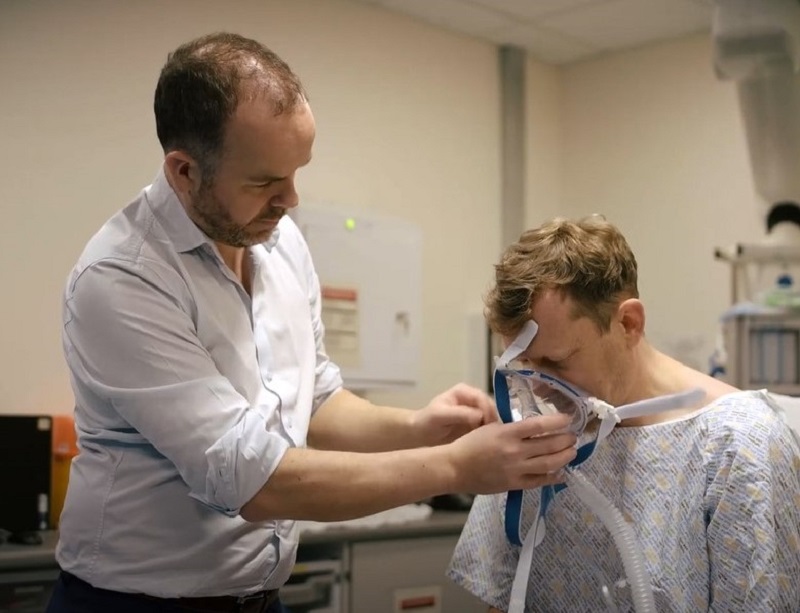- £250m of government funding has been allocated to NHS hospitals to increase capacity as part of the urgent and emergency care recovery plan
- Funding will create 900 beds in hospitals to treat patients more quickly and cut waiting lists
- The plan is part of efforts to increase capacity and improve performance ahead of winter and deliver an additional 5,000 permanent beds
Nine hundred new hospital beds will be delivered across the NHS as part of £250m government drive to help patients receive treatment more quickly this winter, Health and Social Care Secretary, Steve Barclay, has announced.
The funding has been awarded to NHS trusts to relieve pressures and help cut waiting lists, one of the Government’s top five priorities.
A total of 30 NHS organisations across England will benefit from the investment in urgent and emergency care services.
This includes developing or expanding urgent treatment centres and same-day emergency care services, which will help patients to be seen more quickly, without being admitted to hospital.
NHS England expects that the majority of schemes will be completed by January 2024 to help deal with winter pressures.
These 900 new beds will mean more people can be treated quickly, speeding up flow through hospitals and reducing frustratingly-long waits for treatment
The investment is part of the NHS urgent and emergency care recovery plan, published in January this year, which set out plans to provide over 5,000 additional permanent, fully-staffed hospital beds in total, with the NHS on track to deliver this by winter.
These new 900 beds are part of this commitment.
Prime Minister, Rishi Sunak, said: “Cutting waiting lists is one of my top five priorities, so this year the Government has started planning for winter earlier than ever before and the public can be reassured we are backing the NHS with the resources it needs.
“These 900 new beds will mean more people can be treated quickly, speeding up flow through hospitals and reducing frustratingly-long waits for treatment.”
Barclay added: “We know that winter is a difficult time, so we’re working to get ahead of pressures while also creating a sustainable NHS fit for the future.
“That’s why we’re investing this £250m to support NHS capacity and deliver 900 new beds as part of our drive to put in place 5,000 permanent additional beds.
Creating capacity
“Creating additional hospital capacity will support staff to provide the best-possible care and treat patients more quickly, helping us to improve waiting times and cut waiting lists.”
And Amanda Pritchard, NHS chief executive, said: “Winter is always a busy time for the NHS and so it is right that we put robust plans in place as early as possible to boost capacity and help frontline staff to prepare for additional pressure.
We know that winter is a difficult time, so we’re working to get ahead of pressures while also creating a sustainable NHS fit for the future
“Our winter plans, which build on the progress already made on our urgent and emergency care recovery plan, aim to reduce waiting times for patients and transform services, with an expansion of same-day care and virtual wards, helping patients to be cared for in their own home where possible.”
In total, the schemes will create 900 beds, which includes over 60 intermediate care beds and improving assessment spaces and cubicles in A&E.
Examples of schemes include Peterborough City Hospital, where £12.5m will be used to provide 72 hospital beds through the conversion of under-utilised non-clinical space.
In London, at Northwick Park Hospital, a 32-bed modular acute medical ward is being created through a £22.6m investment to increase the hospital’s capacity this winter.
And several trusts will develop or expand urgent treatment centres to treat patients more quickly, helping to reduce waiting times, including Hull Royal Infirmary, James Cook University Hospital, Airedale General Hospital, and Worthing Hospital.
Some trusts will also use the funding to develop or expand same-day emergency care services, including at Whipps Cross Hospital, Royal Surrey County Hospital, Croydon University Hospital, and Worthing Hospital.
Lenus Health's RECEIVER trial was found to halve COPD admissions through the use of digital tools
The power of technology
But healthtech leaders are warning that the NHS will need to improve its adoption of innovative technologies to fully realise the benefits of this funding.
Paul McGinness, chief executive of Lenus Health, told BBH: “The NHSE statistic that 20% of emergency admissions are considered avoidable is a stark reminder of the need for a holistic approach.
“Major conditions such as COPD, which accounts for one in eight admissions in the UK, highlight the value of early intervention.
“And the results of our RECEIVER trial, which halved COPD admissions using digital tools, underline the potential of technology in healthcare.
“This evidence-based approach can sustainably reduce admissions, freeing up resources for those truly in need.
By harnessing the power of predictive AI, digital tools to tackle avoidable admissions, we can work towards a more-resilient healthcare system that not only meets the immediate challenges, but also creates a sustainable foundation for the future
Commenting on the funding, he added: “This is a positive step towards easing pressure, particularly in winter, but addressing the root causes of admissions is as important as adding beds to accommodate these patients.
“Targeted investment in prevention is vital and dedicating resources to predictive AI to help prevent admissions is forward-thinking and has the potential to re-orientate to proactive care models.
“With predictive AI, healthcare professionals can identify patients at risk, target their limited resources at those high-risk patients, intervene early, and reduce unnecessary downstream hospital admissions.”
But he warned: “Alongside the Government’s commitment to increasing capacity, we must adopt a multi-faceted approach that combines increased bed numbers with innovative technology and prevention strategies.
“By harnessing the power of predictive AI, digital tools to tackle avoidable admissions, we can work towards a more-resilient healthcare system that not only meets the immediate challenges, but also creates a sustainable foundation for the future.”
